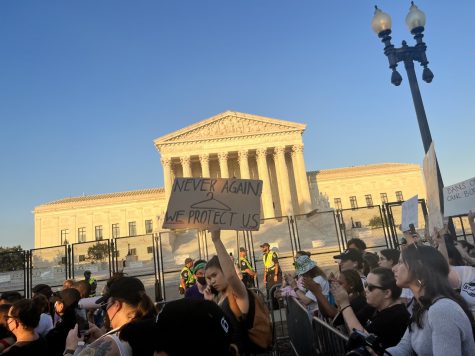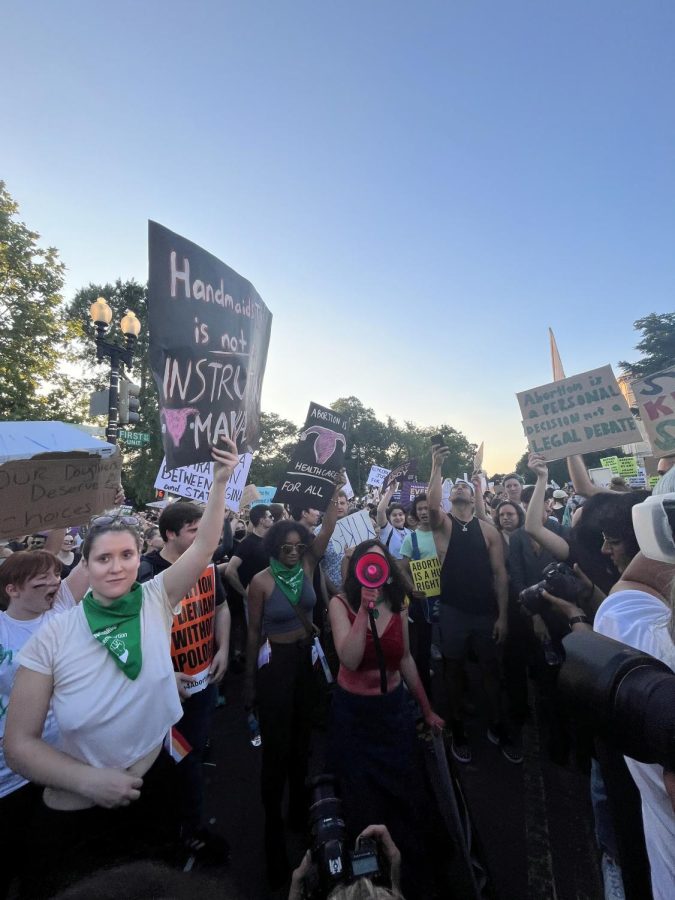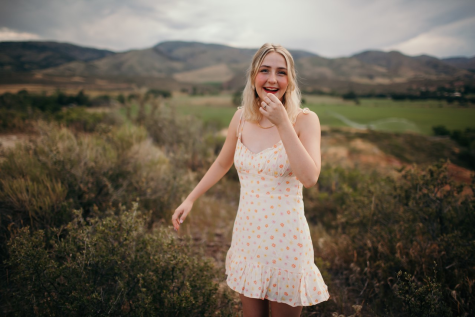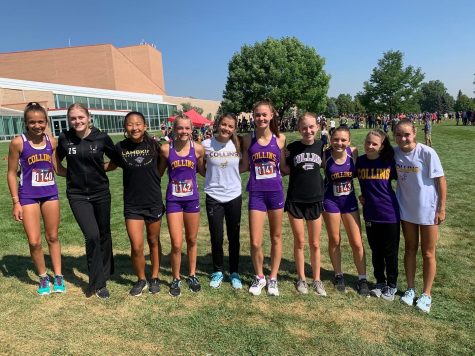On the steps of the Supreme Court
My experience protesting in D.C. the day Roe v. Wade was overturned
Recounting her own experiences, a protestor shouts in outrage in front of hundreds in Washington as Roe is overturned.
November 3, 2022
Editor’s Note: This story details the experiences of the writer in which she protested for something she believed in. Spilled Ink and FCHS take no stance on this deeply personal and controversial issue. Spilled Ink wishes to share the stories we think are important, to provide a voice for the voiceless, and reflect on topics likely to be featured on upcoming ballots.
“You guys are here on a good day,” the tour guide said, dressed in khakis and the tackiest bucket hat I’ve ever seen. We all knew. We had been waiting for it all week, but I kept pushing the thought to the back of my brain, too focused on having fun to confront it. We walked toward the Supreme Court, continuing to joke in good spirits, and ignoring the dark cloud that had been following us since May 2.
My new friend Maya had been refreshing the news page on her phone ever since we had arrived at our DC summer camp, organized through the School of the New York Times, but today she seemed particularly intense. Then she stopped.
“It’s in,” she said. “Roe v. Wade has just been overturned.”
And then. Everybody. Stopped.
My thoughts vocalized: “I feel like I’ve been hit by a truck.”
Those same feelings climbed up my throat, and out of my eyeballs. And just as I felt them, I watched as all my new friends, in my new class, suffered all those same 100 million different thoughts all at once.
Sadness, disappointment, but mostly, fear—fear of what it would be like for all of us young girls with seemingly bright futures to have to grow up in a world where we are seen as mere incubators, denied necessary healthcare such as birth control and abortion.
Anna and Zoey and Kaitlin and Abbey cried with me, as did our teacher, Ms. Catherine Greene. Heather and Angie tried to comfort us while accepting what this would mean for their own futures. Fiona and Caroline and Kate seemed so brave in the face of utter despair, I’m still not sure how they did that.
Of course, it did not help that as we all tried to process this life-changing news, we continued our march past the Supreme Court, and those celebrating in front of it. Sounds of cheers and champagne popping and tears of true joy flowed from others who had a fundamental disagreement over what this meant for us, mimicking gunshots and made our trek all the more fearful.
As we pressed on, a green and silent sea engulfed us.
One strong voice stood out over the distant sound of joy, and I locked eyes with its owner. She nodded her head at me. “I know you are scared,” she said, not wavering even as she cried. “I know you are hurt.
“There will be time to mourn. But right now, we must fight.”
We all turned to our teacher. Ms. Greene only nodded, “Go protest,” she approved. “Stay safe.”
As my friends and I crossed the border away from bystanders and into the sea, the silence erupted into chants. Not celebratory, as those on the other side of us had been, but determined, hurt and brave all in one.
“Rise up for abortion rights, for abortion rights, rise up!”
The cheers were persistent, and in my hopelessness, they lent me power. I never knew words could give me so much.
When I wasn’t chanting I was listening. Leaders of the organization Rise Up for Abortion Rights spoke of the green posters we held up, and the green bandanas my friends and I now wore around our wrists, and how they symbolized our connection to Latin American—specifically Argentinian—sisters, who fought and won their battle to the right of abortion. They also spoke of the Supreme Court, and how 3 of the 5 justices who voted to take away the right to abortion were appointed by a president who has spoken of women as objects to be used and discarded.
When the leaders were done talking, they allowed speakers to come up, in between chants. And this is when I learned that many activists around me had been there for days, preparing for the news.
They came from all over the country, just as my friends had.
Anna from New York, and Angie from Virginia, and I from Fort Collins, Colorado, tried to support Kaitlin from Arizona, and Zoey from Texas, who grappled with the definitive fear of their states’ looming trigger laws.
I gave Zoey a hug, even though we had never really “clicked” before. The common hurt newly bonded us, and her tears broke my heart and comforted me in solidarity.
And when Kaitlyn was asked to be interviewed for PBS Arizona, I told her that if she went, I would hold her hand, because I knew how important her voice was at that moment. I knew she mattered as a young girl in a conservative state, even if her supreme court justices did not share my understanding.
Together, we became the audience to every word of activists, as they told their stories.
CONTENT WARNING: The following content contains graphic language around the topic of sexual assault. If you wish to skip this section, scroll to the next subheading.
“My name is Araceli,” she said, her accent prevalent in her wavering voice.
Araceli told us about her dreams. About how when she came to San Antonio, Texas, she wanted to be a biologist. She worked to put herself through school to make a life for herself. To break out of the poverty in which she had been raised. It was at this time, as she was studying biology, following her dreams, that seven, seven, of her classmates violently raped her. One after the other.
Then, she told us when she found out that she was pregnant, and when she found a doctor, she was denied an abortion. She was crying, shaking, as she remembered pleading, begging, desperately for an abortion. She could not raise the baby of one of her rapists, and pursue the life she had always wanted. But she was denied nonetheless.
Now an elderly woman, Araceli was standing in front of us, shouting through her tears, “When my son asks me who his father is, I do not have an answer for him, because I do not know which of my rapists is responsible for my pregnancy.
She continued, stronger now, “I ask my Supreme Court to answer: what kind of life could I have led, could I have given to my son, if I was able to become pregnant on my own terms?”
Somewhere distant the sound of joy roared up once again, and I was returned to the moment. I had always known that being pro-choice was more than just a political identifier. But it was here, in this place, on the steps of the United States Supreme Court, snipers mounted on the roof, that it became real. Araceli’s story was real.
And so quickly, her story has become the reality of others. In states like Ohio, Wisconsin, and Texas, healthcare professionals are being forced to rely on century-old laws to decide whether they will be fired, sued, or imprisoned for providing a potentially life saving procedure. Women in need of abortion care in conservative states are increasingly turning toward illegally taking the abortion pill, according to the New Yorker. The pill, a method of self-induced abortion, can result in infection, blood clots, ectopic pregnancy, or heavy bleeding if not overseen by a medical professional.
And now, women’s rights activists are warning these instances will become commonplace. As more women all over the country without the means to travel for healthcare will be trapped into cycles of poverty, confronted with raising children they cannot afford, and that the foster care system cannot protect. In an interview with the WAMC, Mariah Craven with the National Foster Youth Institute explained that post-Roe pressures create a situation in which “the issues that put young children and young adults into foster care are just going to be exacerbated.”
Araceli and many like her are still fighting for the rights they have been denied. Now, other women, who will increasingly be faced with the same trauma, will hear and respond to the call to protest. Araceli is still standing. She and many others are working to change the ending of their stories, still fighting, surrounded by a community that uplifts them as they do so.

Protest and Protect
This community held their signs up high.
“Moms for Choice,” some read.
“Legal Abortion on Demand and Without Apology.”
“Pro-Choice, Pro-Woman.”
“Never Again,” another said, above a drawing of a bloody hanger. Underneath the hanger were words bolded and underlined: “We Protect Us.”
It is a phrase I became familiar with on my second day of protesting.
It was echoed and emphasized by Harriet’s Wildest Dreams, a Black-women-led organization. When they spoke, they spoke of real work. They spoke of what we can do to protect one another now, and how we could donate and help those around us to find safe abortion care through erupting online channels, should they need it.
They spoke of how this new ruling had been the reality for Black women for a long time. It had always been a struggle for this demographic to find access to birth control and abortion care. But now it would be almost impossible.
“Look around,” a woman said, in tears, pointing to the heavily armed officers standing between us and the gate to the Supreme Court. “They aren’t here to protect us. They have never protected us. They are here to protect this property.” She pointed to the big white columns behind us.
It was a sentiment I had never considered, but it was true that in that moment I felt more protected by the strangers around me, than by the men with big guns staring blankly at us.
Then, suddenly, she yelled, “Who keeps us safe?”
Immediately, the crowd around me erupted.
“WE KEEP US SAFE.”
Again.
“Who keeps us safe?”
“WE KEEP US SAFE.”
I felt my throat grow scratchy and weak.
“Who keeps us safe?”
As the voices floated up into the air and around me, I looked again at the Supreme Court Building, and my eyes fell on an inscription: “Equal Justice Under Law.” It almost made me laugh.
“WE KEEP US SAFE.”
My legs were exhausted, I was sweating, and the sun was seeping into my skin and the burn was beginning to sting, but I was getting louder now.
Persistent still: “WE KEEP US SAFE.”
I was amazed here, in the wake of all the emotional and physical pain, the pain of hearing my mother’s voice in the back of my head (“I can’t believe my daughters will grow up with less rights than I did”); the pain of watching my friends who had been glowing the whole week prior, break down, the pain of hearing from these women, so strong and brave, that we must fight because nobody else is willing to do so. Not even the people who are supposed to be protecting us.
Even in all this pain, there emerged a tenacity from these people determined to fix this wrong. I felt inspired and loved by this group of strangers. There was something powerful in knowing they were looking out for me, and that I was looking out for them. Even more powerful was that instead of choosing to stay at home and cry and forget about this, this enormous crowd chose to come here, front and center, to make their voices heard.



